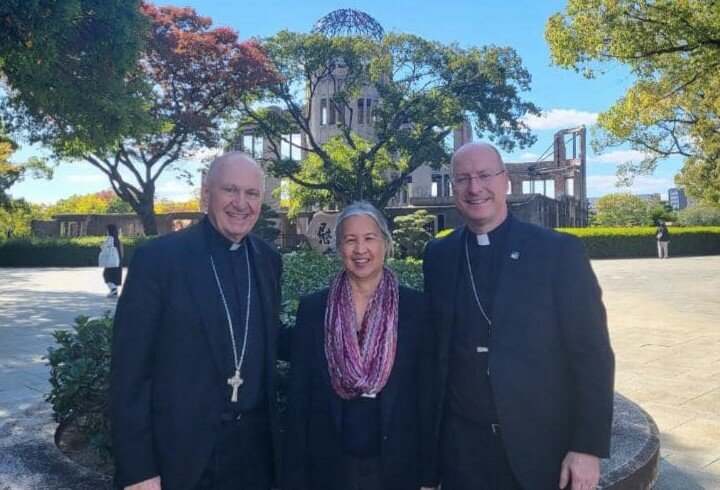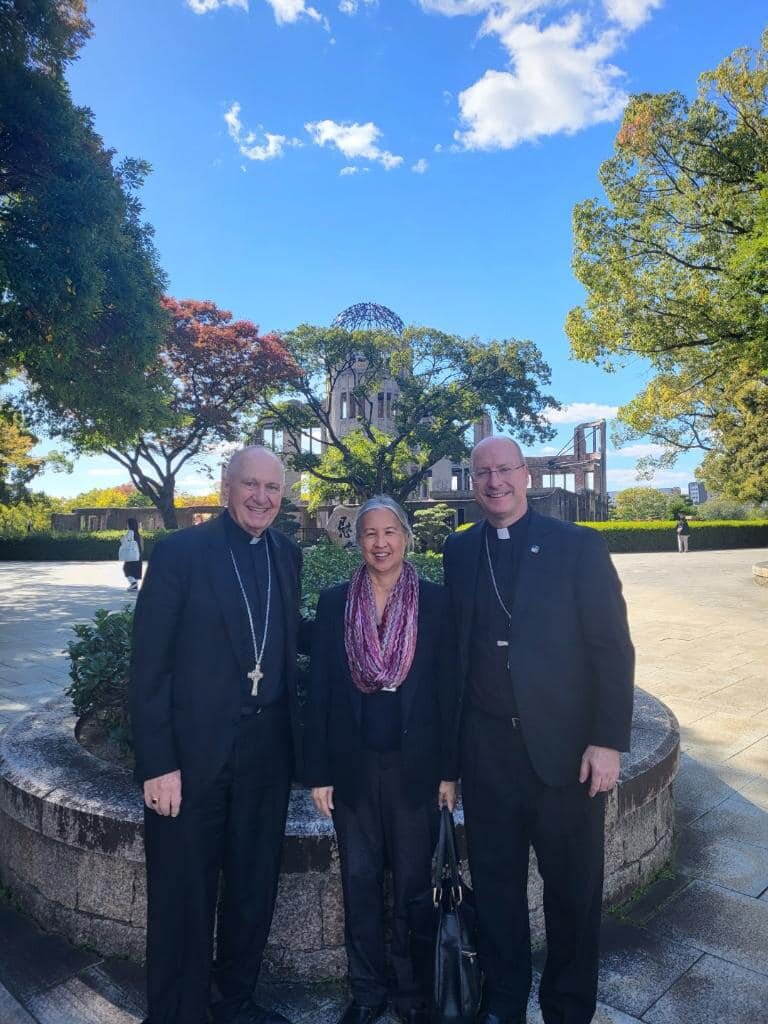MAKING CONNECTI0NS — The Church and world peace

During a recent trip to the Republic of Korea (South Korea), I visited a cemetery located high on a hill overlooking a river valley.
Standing amid the graves on this hill, one could see into North Korea, where U.S. Army Chaplain Father Emil Kapaun, Servant of God, was captured before giving his life in service to fellow prisoners of war.
The cemetery was intentionally built this way, facing north toward the land long seen as hostile enemy territory.
Many people buried there were North Koreans who had fled to the south during the decades-long war. Never able to return home, they died in exile.
The exiled North Koreans were reverently buried on this north-facing hill so that they could spiritually gaze upon their homeland in death.
This experience was a solemn reminder of the awful effects of war, especially how conflicts can leave families divided — loved ones never to be seen again.
I had been invited to travel to Asia for a conference held at the Peace and Unity Center in Paju, South Korea, and at the Memorial Cathedral in Hiroshima, Japan.
The conference, held in late October, was convened to discuss the role of the Church in the promotion of peace and reconciliation on the Korean peninsula and in Northeast Asia.
It was my first time in South Korea and Japan, and I learned a lot about their cultures, the state of the Catholic Church in each country, the historical and present impact of war in Northeast Asia, and the importance of the Korean peninsula for achieving peace throughout the whole world.
I was a member of a delegation of three bishops from the United States with a contingent of Catholic policy experts from the U.S. Conference of Catholic Bishops, the University of Notre Dame, and Georgetown University.
There were two archbishops, six bishops, and dozens of priests and laity from South Korea and Japan at the conference, as well as some UN and international NGO participants.
Together, we experienced the solidarity that exists between the three episcopal conferences, as we are united in our common mission of promoting the peace of Christ.
New friendships were formed, and we all benefited from the dialogue that took place between the policy experts, youth and pastors.
The last session was a dialogue between youth and the bishops present for the conference; I was encouraged and filled with hope by the faith and passion of the young people, just as I am with the youth of our diocese.
The most moving experiences for me, however, were those of our prayer together, especially the celebrations of Mass at the Roman Catholic chapel in the Joint Security Area military base on the Demilitarized Zone, and our Sunday Mass in the Cathedral in Hiroshima.
The active presence of the Catholic Church in these places, marked in their own ways by conflict and aggression, is like a light shining the darkness.
Obviously, my presence in the conference was as a pastor and not as a policy expert, although Catholic Social Teaching has a lot to say about the Christian values and principles we must always uphold even when justifiably defending ourselves.
I heard about the need to transition from policies of “peace through strength” to conflict-resolution based upon “peace through trust and verifiable accountability.”
The Church has her own mission of reconciliation among those who have been traumatized by the hellish effects of war long after the hostilities cease and treaties are signed.
Christ’s peace is not the peace that comes with a mere legal resolution of a dispute; no, it includes a sense of “restorative justice,” which serves to heal past hurts, makes right what was done wrong, and provides a deeper and more authentic spiritual peace as a fruit of the Holy Spirit.
Restorative justice requires both sides to listen to each other and face the awful reality of trauma done to others.
For me, our tour of the Hiroshima Peace Memorial Museum drove home the need for us to face the reality of what nuclear weapons can do, and that our Catholic Faith obliges us to work toward the elimination of all nuclear bombs or any kind of weapon of mass destruction.
Easier said than done, I know. But new efforts are needed to reframe negotiations for the elimination or at least the reduction of these horrific tools of war based upon principles of trust and verifiable accountability.
I certainly pray harder now for politicians, diplomats and policy experts to break new ground in reducing these weapons for the security of the whole world.
We must first begin, however, with ourselves. Right now, war rages in Ukraine, the Holy Land, Syria, Africa and Afghanistan, and war technically continues between North and South Korea.
As Catholics, we have spiritual solidarity with all our brothers and sisters who suffer the violence of war. But to export peace to areas in conflict, we must first be agents of peace within our own families and within our own communities.
How might restorative justice practices be used more in our own schools and parishes as a means of dealing with past hurts, which normal discipline and punishment don’t adequately address?
The Bishops of South Korea have asked their flocks to pray for peace every night together at 9 p.m., a prayer born of our hope in the Risen Christ and in the power of the Holy Spirit.
May we join them with our prayers and in our efforts to promote peace through trust.
Comments
Other items that may interest you
Services
The Catholic
Missourian
2207 W. Main St.
Jefferson City MO 65109-0914
(573) 635-9127
editor@diojeffcity.org







